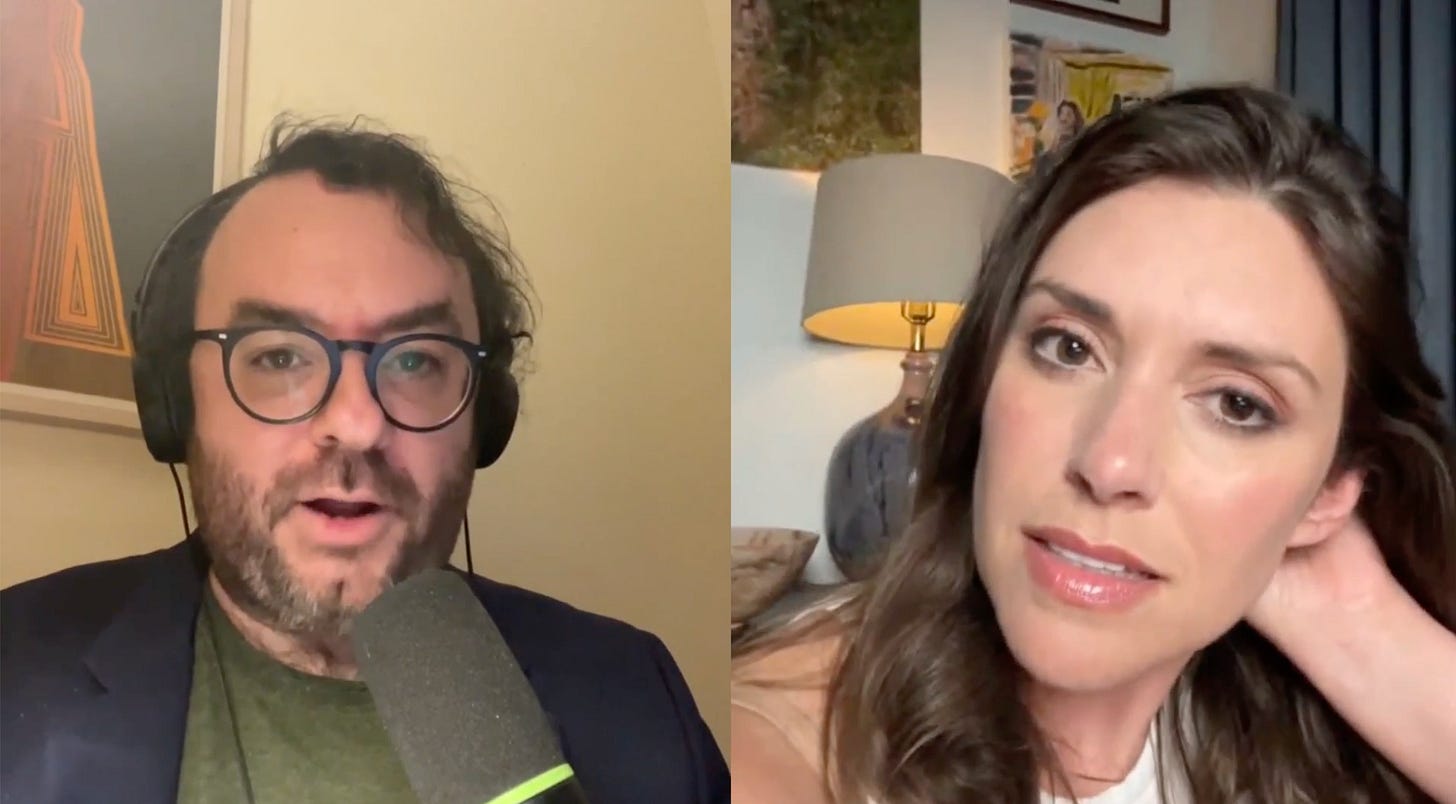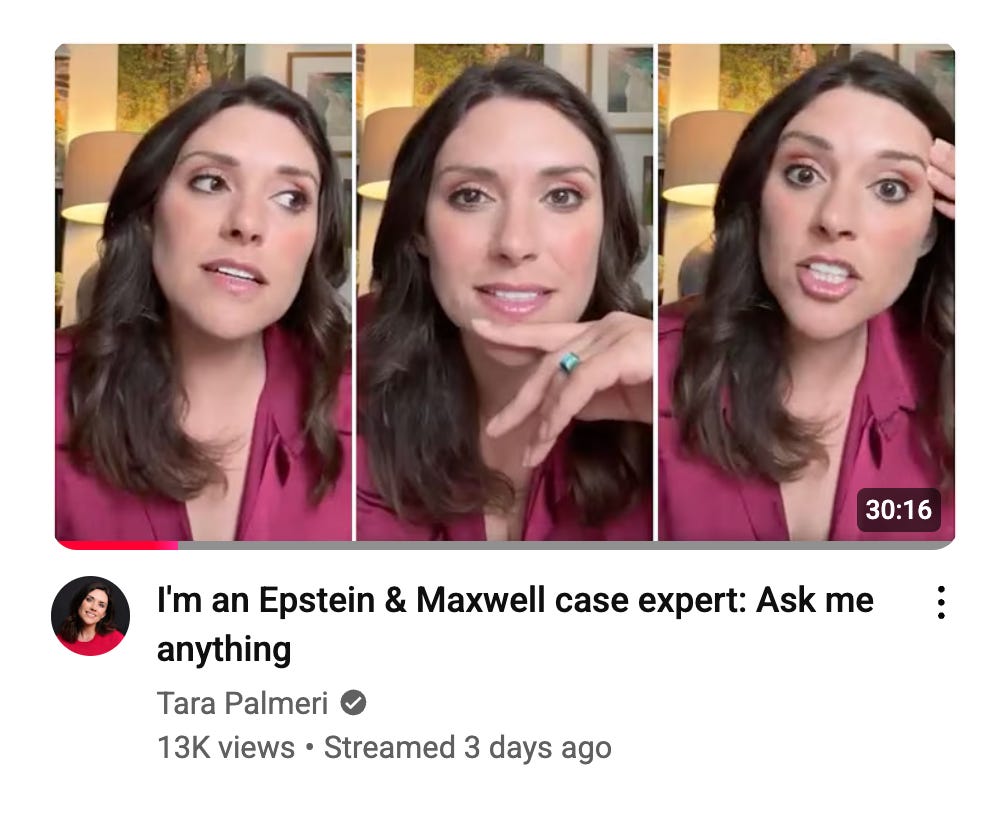This is what happens if you dare to ask the most gently critical questions about the media and Epstein
There is simply no popular constituency for any rational scrutiny of the many fantastical assumptions underpinning this entire Epstein matter, even as it continues to bizarrely engulf the American political and media system. At this point, I freely admit that I too am engulfed, albeit for slightly different reasons than most. Donald Trump ensures the “Summer of Epstein” won’t be ending anytime soon whenever he opens his mouth, having been asked about Epstein once again yesterday while visiting his golf course in Scotland, upon which Trump once again appeared to dismiss the entire thing as a “hoax” created by Democrats. Ghislaine Maxwell has been engaged by the Justice Department in discussions of unclear parameters. Everywhere you look, it’s still all Epstein, all the time. And so, don’t you think it should be permissible to ask critical questions, and raise some probing issues, to better inform the public about what’s really going on? Or should we all just stand aside and let unrestrained hysteria rule the day, with protesters now showing up to events screaming at everyone from JD Vance to Ron DeSantis that they are either enabling pedophiles, or pedophiles themselves? When is it acceptable to conclude that we have exited the realm of reason here, and a correction might be needed?
Last week I asked journalist Tara Palmeri if she would do a livestream with me about Epstein. I told her that I’ve been a critic of the prevailing media coverage; it’s not as though I’ve hidden any of my views on this subject. She agreed. I invited Palmeri because she’s widely considered to be one of the country’s foremost journalistic experts on Epstein. Prior to joining my stream last Thursday evening, she had been on MSNBC’s All In with Chris Hayes. She’s frequently brought on CNN as the “expert” to whom viewers are invited to submit their questions about Epstein, and then she will provide the answers. She also identifies herself as an “expert.”
For years, Palmeri has played an outsized role in informing public perceptions of the Epstein story, and she also has a unique personal connection. Palmeri declares herself a “dear friend” of Virginia Giuffre, the central Epstein accuser who first introduced the now-ubiquitous claims of a widespread child sex-trafficking operation, in which untold prominent individuals were compromised in illicit sexual encounters and then blackmailed. Palmeri’s friendship with Giuffre dates back to a curious journalistic endeavor the two embarked upon five years ago, in what was called an “acclaimed investigative podcast” from Sony Music Entertainment and Hollywood director Adam McKay. The first season of the podcast, entitled Broken, featured Julie K. Brown, the Miami Herald journalist whose 2018 series generated massive renewed interest in Epstein, and which Brown herself credits for having stimulated federal prosecutors to take renewed action against him. (More on Brown another time.) So in other words, this well-resourced corporate podcast brought out the big guns, with the aim of becoming the definitive audio production on the sizzling Epstein story.
Palmeri narrates the second season, which debuted in September 2020. The premise is that she has met up with Virginia Giuffre, who traveled back to the United States from her residence in Australia, and now they are traveling around the country together tracking down figures from Giuffre’s past who they claim could provide vital information about Epstein. Rather astonishingly, Giuffre wasn’t used just as a source or an inspiration for this exercise, but as an active journalistic collaborator, as though the two were sharing a byline.
Palmeri explains the premise of this collaboration as such: ”What Virginia really wants is for someone who was there to say, I remember you, what Epstein did was wrong and horrible, and I'm sorry that was your childhood. She isn’t looking to sue anyone else.” Giuffre, as co-narrator, adds: “Jeffrey is dead, and you know, we’re not coming after you criminally. We’re just coming after you for answers to help.” The implication was that any person Palmeri and Giuffre might approach to give “answers” had no real reason to be reluctant to talk to them, because there were no legal ramifications at play. It was just a pure truth-seeking exercise — to help the purported victims. A completely selfless pursuit in the best traditions of journalism.
But the premise claimed by Palmeri and Giuffre was totally false. Giuffre and her aggressive team of high-powered lawyers led by David Boies did in fact “sue someone else” after the release of this podcast, contrary to Palmeri’s noble-sounding assurances, when they brought a lawsuit against Prince Andrew in August 2021. And this wasn’t just any lawsuit: it yielded a giant payout of roughly $13 million, with a portion nominally earmarked for Giuffre’s anti-sex trafficking NGO in Australia, which appears to have never actually done anything other than serve as a web portal for Giuffre’s various media activities in relation to the lawsuit. It’s not even clear if the outfit ever registered as a charity. Still, Giuffre was able to use her proceeds to purchase a palatial, secluded ranch estate, in addition to her oceanfront mansion.
The notion that Palmeri and Giuffre’s innocent inquiries could not result in any of the sought-after subjects exposing themselves to criminal liability was also totally laughable. The podcast was recorded in early 2020, when the FBI and DOJ were feverishly investigating Ghislaine Maxwell, who became their chief target after Epstein’s death in prison the previous August. They were thus assembling whatever case they could make to prosecute an alleged child sex-trafficking conspiracy, which could potentially ensnare all manner of people who might have only played the most peripheral role in allegedly facilitating the conspiracy, given the nebulousness of prosecution-friendly conspiracy statutes. Any of the people that Giuffre and Palmeri were seeking out for “answers” at that time would’ve been crazy to speak to them, and would’ve been commanded against doing so by any lawyer with half a brain.
Tara and Virginia first travel to Southern California to try to buttonhole Epstein’s former personal chef, Adam Perry Lang, but are unsuccessful, and ultimately only receive a cursory text message with lawyer-approved language. Next, they go to Florida, where they approach the residence of one of Epstein’s former pilots, Larry Visoski, and manage to get him on the phone through a gate attendant. Giuffre says into the phone, “This is Virginia Roberts — so, I used to fly on the plane all the time with you guys. You remember the first time, like you guys put me in the cockpit and with you and David, and I was like, this is like a roller coaster, and it was so much fun from Florida to New York.” This sure sounds like an attempt to elicit an affirmative statement from Visoski that he was party to some interstate trafficking conspiracy, which is precisely what the Feds would’ve needed at the time to prosecute.
Then something truly insane happens. Juan Alessi, a former maintenance man at Epstein’s house in Palm Beach, inexplicably lets Palmeri and Giuffre into his residence for a chat. Palmeri is peeved when Alessi says that the females he generally saw coming in and out of the house “were adults, and they were massage therapists.” Alessi insists, “Swear to God, Virginia… Never saw you naked. I saw other girls, adults, not you.” At some point during the chat inside Alessi’s house, his phone rings, and it’s the FBI. Either this is one of the craziest coincidences of all time, or the FBI was surveilling Alessi, Giuffre, and/or Palmeri — or Giuffre, and by extension Palmeri, were collaborating in some fashion with the FBI. In which case, it would certainly cast this journalistic endeavor in an entirely different light. Palmeri also claims that Giuffre’s phone battery later exploded. So what exactly was going on here?
I’d been planning to ask Palmeri for clarification on the stream she’d generously agreed to join. But, as you’ll see in the video below, she got all irritated and left in a huff after only a few minutes.
I was also going to ask her what I consider to be other substantive and necessary questions, such as: given the demonstrable record of Virginia Giuffre’s serial fabulism, typified but certainly not limited to her admission that she had falsely accused Alan Dershowitz of committing child-sex crimes against her on at least six separate occasions, how do you now evaluate Giuffre’s credibility as your one-time journalistic collaborator? Especially given what you say was your heart-felt personal relationship with Giuffre, who died by reported suicide earlier this year? Palmeri already seemed annoyed that I had asked if she knew the grounds on which local Australian authorities had barred Giuffre from having contact with her children, and awarded custody to her estranged husband. Or that I’d asked if Palmeri had any additional information about the heinous bus crash Giuffre claimed to have been gravely injured in, only for local Australian police to report that the accident was “minor” and produced no injuries.
But when I brought up the Dershowitz thing, she lost the thread of being able to conduct any further rational exchange. Instead, she accused me of having been “sicced” on her by Dershowitz, as though I was his secret agent. (Hilariously untrue.) At that point I couldn’t convince Palmeri to continue conversing normally, and she left.
Excess credulity toward self-identified “victims” has been a hallmark of this entire Epstein saga. It’s a central reason why there’s such aversion to interrogating the premises of the tantalizing narrative that so many people confidently profess to believe. And, at the very least, it should be a topic that can be calmly and dispassionately discussed with a fellow journalist. But I somehow doubt Palmeri has ever been asked even the most gently critical questions about any aspect of her Epstein coverage. Which says a lot about the unexamined, moralizing certitude that’s been allowed to proliferate.
Please note, Virginia Giuffre is a person who claimed in her unpublished memoir manuscript to have had “intercourse” with a Harvard professor named Stephen on Epstein’s island, only to deny in a subsequent deposition that she ever had sex with this person. She promoted at least two proven hoaxsters who claimed to have pilfered video footage from Epstein’s properties showing prominent individuals having sex. She even got involved in QAnon nonsense. At what point are we allowed to ask journalists who not only uncritically amplified this person’s claims, but in Palmeri’s case professionally collaborated with her, how they could possibly continue to stand by her credibility? Because if Giuffre’s credibility collapses, so much of the wider Epstein mythology also collapses.
Below, you’ll see the video of my stream with Tara Palmeri, which she angrily and prematurely ends after accusing me of being a henchman for Alan Dershowitz (LOL). You’ll also see the long email I sent her afterwards, which she still has not replied to.



